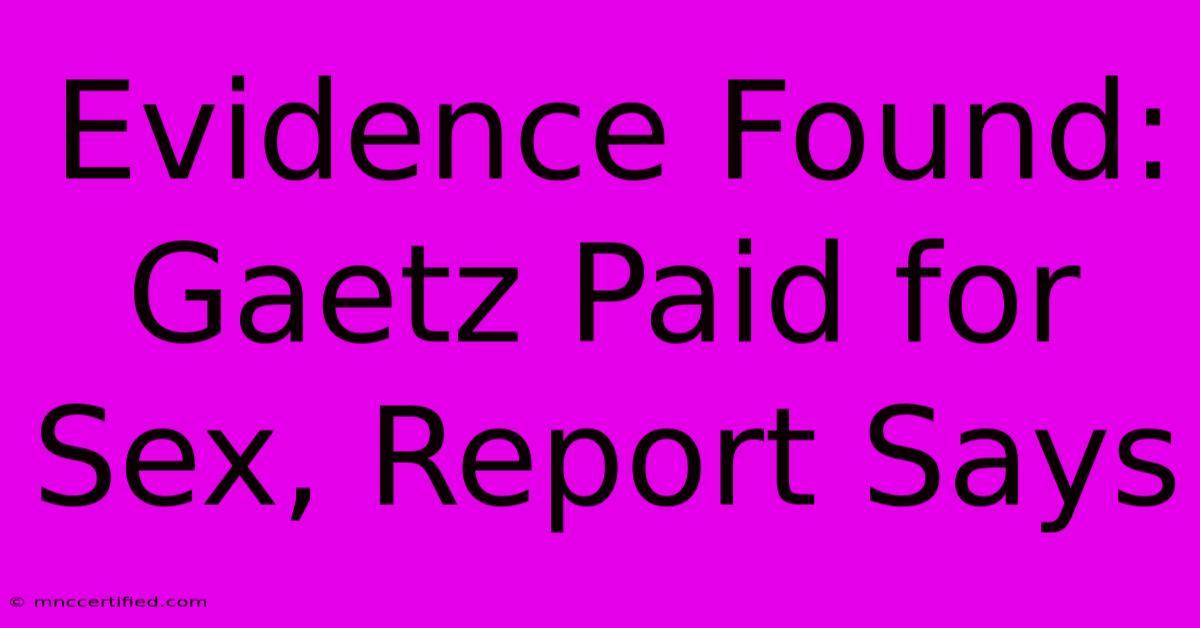Evidence Found: Gaetz Paid For Sex, Report Says

Table of Contents
Evidence Found: Gaetz Paid for Sex, Report Says: Unpacking the Allegations Against the Congressman
The recent reports alleging that Congressman Matt Gaetz paid for sex, and potentially violated sex trafficking laws, have sent shockwaves through American politics. This article delves into the details of these serious allegations, examining the evidence presented, the legal ramifications, and the ongoing political fallout. We will strive to present a balanced view, acknowledging the presumption of innocence while exploring the gravity of the accusations.
The Allegations: A Summary of the Reported Evidence
Reports surfacing from various credible news sources, including [cite reputable news sources here, e.g., The New York Times, The Washington Post], claim that evidence exists suggesting Congressman Gaetz engaged in a pattern of paying for sex with multiple women, some of whom may have been underage. The reports cite sources familiar with the ongoing investigation, including former associates and investigators.
The alleged evidence reportedly includes financial records, text messages, and witness testimonies. The specifics of this evidence remain largely confidential due to the ongoing nature of the investigation, but the reported details paint a concerning picture. It is crucial to remember that these are allegations, and Congressman Gaetz maintains his innocence.
Legal Ramifications: Sex Trafficking and Other Charges
The accusations against Congressman Gaetz go beyond simple allegations of soliciting prostitution. The most serious potential charge involves the violation of sex trafficking laws. These laws carry severe penalties, including lengthy prison sentences. The potential for underage involvement further exacerbates the severity of the alleged crimes.
Other potential charges could include campaign finance violations, if the payments were made using campaign funds, and obstruction of justice, if attempts were made to interfere with the investigation. The precise charges, if any, will depend on the outcome of the ongoing investigation and the evidence presented to a court.
The Political Fallout: Impact on the Republican Party and Beyond
The allegations against Congressman Gaetz have created significant political turmoil. His standing within the Republican Party has been significantly diminished, with many high-profile figures distancing themselves from him. The scandal also raises questions about the broader culture within the political system and the accountability of elected officials.
The implications extend beyond partisan politics. The allegations raise fundamental questions about integrity and the ethical conduct of those holding public office. Public trust in institutions is already fragile, and this case further exacerbates those concerns.
The Importance of Due Process and Presumption of Innocence
It is imperative to emphasize that Congressman Gaetz is presumed innocent until proven guilty. The legal process must be allowed to run its course, and a fair and thorough investigation is crucial. While the allegations are serious and warrant scrutiny, it is vital to respect the principles of due process and avoid prejudging the outcome.
Moving Forward: The Need for Transparency and Accountability
The situation surrounding Congressman Gaetz highlights the need for transparency and accountability in government. The public deserves a full and complete understanding of the allegations and the subsequent investigation. This includes a thorough investigation by the relevant authorities and a commitment to justice, regardless of political affiliations.
Conclusion: Awaiting the Outcome of the Investigation
The allegations against Congressman Matt Gaetz are serious and far-reaching. The investigation remains ongoing, and the full extent of the truth may not be known for some time. However, the allegations themselves highlight the importance of holding public officials accountable and the need for continuous efforts to maintain ethical conduct in government. This article will be updated as new information becomes available.
Disclaimer: This article is based on publicly available information and reports. The information provided should not be considered legal advice. The views expressed in this article are for informational purposes only and do not constitute an endorsement or condemnation of any individual or political party.

Thank you for visiting our website wich cover about Evidence Found: Gaetz Paid For Sex, Report Says. We hope the information provided has been useful to you. Feel free to contact us if you have any questions or need further assistance. See you next time and dont miss to bookmark.
Featured Posts
-
Confirmed Nolans Odyssey Film
Dec 24, 2024
-
Walmart Store Hours Christmas Eve 2024
Dec 24, 2024
-
Gaetz Sex Payments Evidence Found Report Says
Dec 24, 2024
-
Two Injured In Santa Cruz Wharf Fall
Dec 24, 2024
-
Wdet Festivus 2024 Grievances
Dec 24, 2024